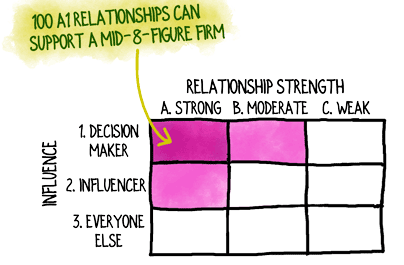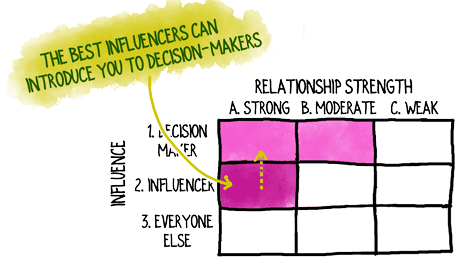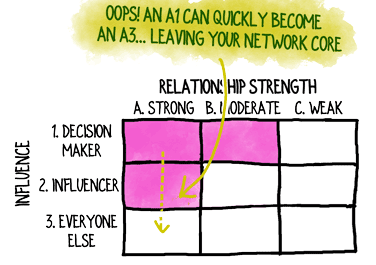In the pursuit of decision-makers, you may be harming your consulting firm’s long-term growth prospects.
The leader staring back at you from the mirror today looks older than they used to. Fortunately, laugh lines and crows’ feet accompany some advantages.

Your years of experience suggest to prospects, clients and your team that you are an experienced, credible provider of solutions, value and restaurant recommendations.
Plus, with each passing year, your longstanding relationships include increasingly senior executives who control increasingly large budgets. The type of people who can hire your consulting firm.
You and any other rainmakers in your firm focus on building connections with decision-makers.
Rightly so. A1 relationships produce the majority of your consulting firm’s revenue.

As I have pointed out elsewhere, your primary intent with A2 relationships is to have them introduce you to decision-makers.
The best level-2 contacts are influencers who consistently introduce you to a lot of decision-makers… then offer you cookies.*

However, there is a downside to focusing all your networking efforts on meeting then nurturing decision-makers.
We’ve seen consulting firms, including sizeable boutiques, tumble down a steep revenue slope when the rainmakers’ A1 contacts start retiring.
Retired executives transform swiftly from A1s to A3s. Great relationships that are irrelevant.

As you enjoy your well-earned maturity, take care to nurture relationships with younger, junior executives who are likely to become decision-makers in the future.
Otherwise, you could be facing sharp revenue declines and frustration when you had hoped your firm would be running on autopilot.
Action Steps:
Every year, identify a handful of promising, young executives with whom you will deliberately cultivate relationships as if they were already decision-makers. Build and execute a relationship plan for them.
Treat junior staff at your clients well; with the same respect and attention you shower on senior staff. (Of course, this is always a good practice.)
Encourage your up-and-coming consultants to foster relationships with their peers in addition to client personnel who are senior to them.
How else do you ensure you’re building relationships that will support your firm in 10-15 years?
Text and images are © 2024 David A. Fields, all rights reserved.

 David A. Fields Consulting Group
David A. Fields Consulting Group 

I must have missed that memo about the A1’s, ever since my early corporate days I look at everyone as an influencer and a leader at some level, so I just connect, communicate, and keep as many people looped in as possible. From adding to newsletter, commenting on LI posts, sharing resources the mode I operate on is the more people are informed then when decisions are made, I’ll have multiple advocates. Upon reflection, perhaps I haven’t focused enough on senior decision makers… so many interesting people and just not enough time. 🙂
Good perspective, Bill! Communicating and sharing broadly definitely makes sense. Of course, there are relationships that warrant more time, energy and effort than a few, simple emails or inclusion on the holiday-card list. The CEO who has delivered $2M in projects to you, for instance, might be a good person to take out for dinner. Since time is limited and contact lists are not, segmentation is generally very helpful for helping you make the most of your time.
As always, I appreciate your contributing your outlook and insights, Bill!
Mentors were scarce for me, so I look for opportunities I can help others. Clubhouse groups, trade show events, Women’s networking groups… lots of opportunities to meet people of all ages. Even if it’s only briefly, mentioning books to read or people to meet. There is so much to learn from professionals at all ages. And, if you find the good ones, they are just as hungry as you are to learn.
That’s a wonderful frame for thinking about younger executives, Jennifer. You’ll rarely go wrong mentoring someone and you’ll often benefit at least as much as the person with whom your sharing advice and experiences.
Excellent addition to the article, Jennifer!
We like to share free resources from time to time to the A2 in an organization. It is small things already created by us, but provides great value to the A2 and make them look great in front of the A1. They tend to not forget the value we provide and then when they are the A1 in that organization or another we are locked in for when they need help. Also to Williams point, connecting with the A2 on LinkedIn is a great way to solidify your expertise in your field and also keep tabs on what’s going on in the company as they often will post about it.
Well said, Michael, and excellent examples of how you can build relationships with A2s. As you point out, when you support someone’s career growth, they remember you (at least some do) when they achieve the higher-level positions. The LinkedIn connection is also a good point to emphasize–thank you for calling that out again.
I’m glad you chimed in, Michael! Very smart suggestions!
Through the years I have met young people who became decision makers and my clients. They were client team members offering opportunities to get to know them well or active on boards and committees. You can do consulting “forever” if you like and clients will be half your age.
Perfect case study, Ilene. Kudos to you for building those relationships and for continuing them (and benefiting from them) as the relationships and people matured.
When your clients are one-quarter your age you’ll know you’ve done something right… or gone into pediatric consulting. (Or maybe that pesky mortality problem was finally solved?)
Ilene, thanks for sharing your first-hand experience for others to learn from.
Excellent advice and great reminder! In the banking industry, we’ve seen this phenomenon play out with most of our client base over many decades. Commercial lenders, CIO’s and CFO’s typically become the next CEO. Fortunately, we have benefitted from maintaining those relationships but in the new age of WFH and remote work, we need to remember that nurturing relationships is becoming more and more challenging and important!
You’ve made an excellent point, Frank. With in-person interaction becoming less common, relationship-building is increasingly difficult. My sense is this plays out even more when there’s a generation gap. For old folks (like me) who did not grow up creating and nurturing relationships virtually via @crinklechips or whatever the latest app is, establishing a deep connection with youngsters via newer communication media takes more conscious effort. Those who grow up on @crinklechips seems pretty good at building relationships that way, though, and they may not have this additional layer of challenge stacked onto the seniority problem.
I’m hugely appreciative of your lending your experience and the case study, Frank, and raising the related challenge.